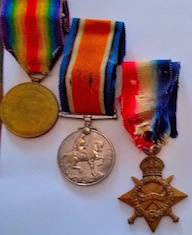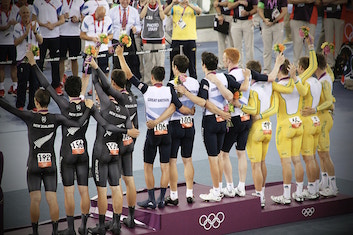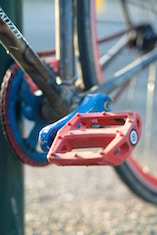Medal and meddle

The difference between medal and meddle is straightforward: a medal is a small, wearable ornament, usually a metal disk, that usually either commemorates an event or has been awarded in recognition of some achievement. We see returned service personnel or their descendants wear their medals as they march on Anzac Day or Remembrance Day; sporting medals are often presented to those who finish first, second and third in an event.
Winners of sporting medals (or other competitive medals) can be referred to as medallists. (Those who have earned war medals are never referred to as medallists.) Sports writers and commentators have also turned the noun medal into a verb: to medal. This new use is particularly common in association with the Olympic Games or other prestigious competitions.
- The British, Australian and New Zealand men’s cycling pursuit teams medalled at the London Olympics in 2012.

This new sporting use of medal as a verb is where there can be some confusion, as English already has another verb that sounds exactly the same: to meddle. But to meddle means something completely different: to meddle is to interfere or intervene in something in an annoying, intrusive way:
- He is always meddling in my work.

Someone who is meddles is a meddler; there is no such word as meddlist.
Pedal and peddle and pedaller and pedlar
Pedal is both a noun and verb. As a noun, it means a foot-operated lever. While the most common usage is with vehicles (bicycles and cars), many items have pedals, from drumkits and pianos to sewing machines.


As a verb, to pedal means to push on a pedal and is nearly always associated with riding a bike, but can be used for any pedals: The organist was pedalling away furiously as her hands flew across the keys.
The verb to peddle is something completely different. It means to sell goods by carrying them around from place to place, and is similar in meaning to to hawk goods. To peddle is not often used these days but peddling continues; it is just that those who peddle tend to use vans rather than carrying or moving their wares themselves.


Someone who peddles is a pedlar; this should not be confused with the word pedaller, which means someone who pedals! The medal-winning cyclists shown above are pedallers, not pedlars.
Of course, it is possible to be a pedalling pedlar (a street vendor on a bicycle) and a peddling pedaller (a bike-rider who is selling goods) at the same time


If you have found this post interesting, you can find a full index to my other posts on the index page. To be notified when I post a new topic, follow me on Facebook! If you have any particular questions you’d like me to answer in future posts, just send me a message. I’m always interested to learn what people think, and how you came across this site, so please post a comment.
If you think you would be interested in either my complete grammar course or an individual customised online course (particularly suited for people who don’t live in Melbourne), just click your preferred option.
Photos: Olympic medallists by Simon Connellan, meddling by John Schnobrich, bike pedal by Axel Dadure, pedal sewing machine by Manlake Gabriel, fruit pedlar by fancycrave, ice-cream pedlar by Florencia Viadana, bicycle flower pedlar by Linh Pham, all on Unsplash